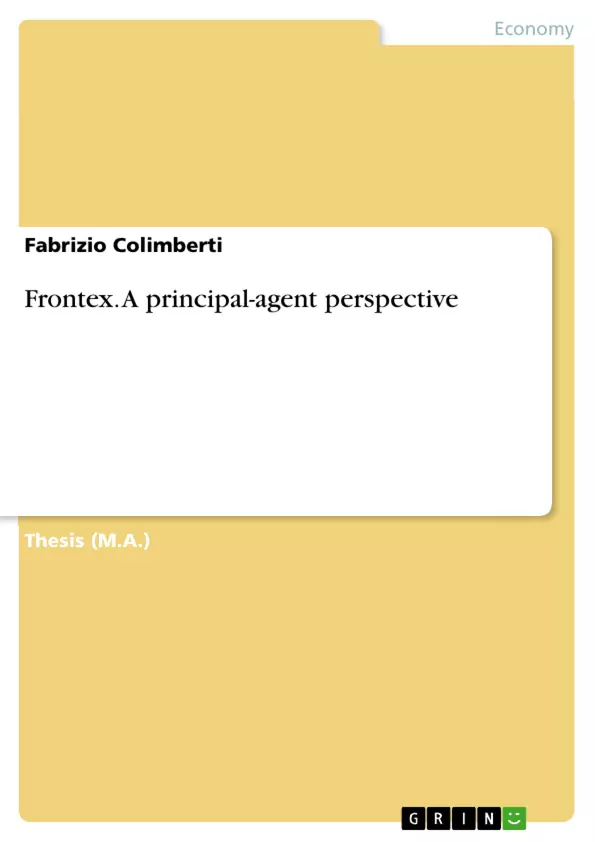The purpose of this research focuses on one of the latest and most significant development of Justice, Freedom and Security policies of the EU: the creation of FRONTEX, the Agency for the Management of Operational Cooperation at the External Borders of the Member States of the European Union, established in 2004 and operational since 2005.
In particular, this paper will utilise a principal-agent perspective in an attempt to explain why Frontex has been established, what roles the various institutions played in the process of, and the context behind, its creation. The paper argues that Member States established an agency borne out of the need to enhance the Area of Justice, Freedom and Security in the context of the Schengen agreements. Consequently, the paper highlights the deficiencies of the structure, especially regarding its independence from its principals, and its current funding regulation limits, that result in a wide range of tasks and a high dependence from the resources of Member States.
However, even if primarily only used in the context of counter-illegal immigration operations, the paper highlights how the agency has been growing steadily in power and resources, and represents a first fundamental step towards an effective communitarisation of border management that could lead, in the long term, to the establishment of a European Border Police.
Inhaltsverzeichnis (Table of Contents)
- Introduction
- Section 1: European Regulatory Agencies
- Agencification in the European Union
- Principal-agent theory: Why, What, How
- Section 2: Research questions, methodology, data
- Research questions
- Methodology and data
- Section 3: Frontex and the external borders of the European Union
- Delegation dilemmas: to guard or not to guard?
- Origins
- First steps
- Agency mission, Regulation, composition and tasks
- Institutional design
- Management Board
- Executive Director
- Staff and structure
- Resources
- Activities output and working methods
- Risk Analysis
- Operational activities
- Research, development, training and cooperation with external bodies
- Joint return operations
- The Member States, the Commission, the Parliament
- Criticism
- Institutional settings
- Brief assessment of output
- Delegation dilemmas: to guard or not to guard?
- Section 4: Conclusions
- Frontex: the road ahead
Zielsetzung und Themenschwerpunkte (Objectives and Key Themes)
This dissertation examines the creation and development of FRONTEX, the European Agency for the Management of Operational Cooperation at the External Borders of the Member States of the European Union. It seeks to understand the factors leading to its establishment, the roles of various institutions in its creation, and the agency's structure, operations, and impact.
- Delegation of powers to regulatory agencies in the EU
- The principal-agent framework and its application to EU institutions
- The role of FRONTEX in managing external borders and tackling illegal migration
- The agency's institutional design, resources, and working methods
- Criticism and assessment of FRONTEX's performance and future prospects
Zusammenfassung der Kapitel (Chapter Summaries)
- Introduction: This chapter introduces the topic of FRONTEX and its significance in the context of EU Justice, Freedom, and Security policies. It highlights the agency's wide-ranging mission and the need to analyze its creation and development.
- Section 1: European Regulatory Agencies: This section explores the historical trend of delegating powers to regulatory agencies in the EU. It examines the 'agencification' process and introduces the principal-agent theory as a framework for analyzing non-majoritarian institutions.
- Section 2: Research questions, methodology, data: This chapter outlines the research questions, methodology, and data sources employed in the dissertation.
- Section 3: Frontex and the external borders of the European Union: This section delves into the origins, mission, structure, and operations of FRONTEX. It examines the agency's institutional design, including its management board, executive director, staff, and resources. It also analyzes the agency's activities and working methods, such as risk analysis, operational cooperation, and joint return operations. This chapter also explores the relationship between FRONTEX and its stakeholders, including the Member States, the Commission, and the Parliament, as well as criticisms of the agency's performance.
Schlüsselwörter (Keywords)
This dissertation focuses on the key concepts of European regulatory agencies, the principal-agent framework, border management, illegal migration, FRONTEX, institutional design, delegation, and the Area of Freedom, Security and Justice (AFSJ). It examines the creation, structure, operations, and impact of FRONTEX in the context of EU policies on external borders and migration.
Frequently Asked Questions
What is FRONTEX?
FRONTEX is the European Agency for the Management of Operational Cooperation at the External Borders of the EU Member States, established in 2004 to coordinate border security.
What is the Principal-Agent perspective used in this paper?
The principal-agent theory is used to explain why Member States (principals) delegated powers to an independent agency (agent) and to analyze the resulting issues of control and independence.
Why was Frontex established?
It was created out of the need to enhance the Area of Justice, Freedom, and Security, specifically to manage external borders following the Schengen agreements.
What are the main criticisms of Frontex's structure?
Critiques focus on its high dependence on Member States' resources, its complex institutional design, and perceived deficiencies in its independence from political principals.
What are "Joint Return Operations"?
These are operational activities coordinated by Frontex to return individuals residing illegally in the EU to their countries of origin.
Could Frontex lead to a European Border Police?
The paper argues that the agency's growth in power and resources represents a step toward the communitarization of border management, which could eventually lead to a unified border police.
- Citar trabajo
- Fabrizio Colimberti (Autor), 2008, Frontex. A principal-agent perspective, Múnich, GRIN Verlag, https://www.grin.com/document/463254



